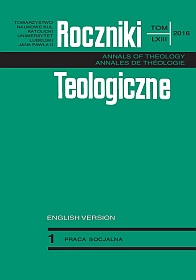Knowledge and Religious Faith
Abstract
Up till now two fundamental concepts of faith (religion) and knowledge (science) have been used in Christianity. In this way the Greek tradition, and especially old-Christian one, is followed, the tradition that distinguished the world of knowledge that is a product of the cognizing mind from the world of revelation that accepts God's non-scientific gift. Christianity’s whole effort was directed at indicating the differences between science and revelation, and then at showing harmony, or at least non-contradiction, between them. This is why Anton Grabner-Haider (*1940), an Austrian philosopher of religion, had to take into consideration also the world of thought comprising science and the world of the experience of faith, including revelation. In turn, he presented the mutual relations between these worlds, understanding science on the ground of the neopositivist conception and faith on the ground of the Church’s popular contemporary understanding of faith. It is a pity he does not use the strictly theological concept of faith, and especially the more modern personalist conception, despite verbally referring to personalism. However, making modern attempts at shifting the problem of faith and knowledge as well as of their mutual relations onto the basis of the language is exactly Grabner-Haider’s achievement. In this way a new situation arises, in which not so much the world of ideas and thoughts opposes the world of religious experience and revelation, as the world of one or two languages does.
References
Abelé, Jean. “Niezależność metody naukowej oraz wolność badacza w stosunku do problemów wiary.” In Nauka i technika a wiara, edited by Jean Abelé, Antoni Podsiad, Zbigniew Więckowski, et al., 75-81. Warszawa: Pax, 1969.
Bartnik, Czesław S., review of Theorie der Theologie als Wissenschaft, by Anton Grabner-Haider. München: Kösel, 1974. Zeszyty Naukowe KUL 19 (1976), no 3: 99-101.
Casper, Bernhard, Klaus Hemmerle, Peter Hünermann. Theologie als Wissenschaft. Methodische Zugänge, Freiburg im Breisgau: Herder, 1970.
Certau, Michel de; Jean Marie Domenach. La Christianisme éclaté. Paris: Seuil, 1974.
Condillac, Etienne Bonnot de. La Langue des calculs. Postume edition. [s. l.], 1798.
Góźdź, Krzysztof. “Struktura aktu wiary.” In Apologetyka personalistyczna, edited by Czesław Stanisław Bartnik. 217-221. Lublin: Standruk 2004.
Góźdź, Krzysztof, review of Credo. Przedmiotowe wymiary aktu wiary, by Janusz Królikowski. Tarnów: [s.l.] 2002. Roczniki Teologiczne 50 (2003), vol. 2: 249-254.
Góźdź, Krzysztof. “Realność i racjonalność wiary chrześcijańskiej.” In Catechetica Porta Fidei by Andrzej Kiciński; Piotr Tomasz Goliszek, 13-21. Lublin: Natan, 2012.
Góźdź, Krzysztof. “Kryzys i moc wiary. Refleksja nad myślą Josepha Ratzingera-Benedykta XVI.” In Roczniki Teologii Dogmatycznej 4 (59) 2012: 7-18.
Góźdź, Krzysztof. “Logosowy charakter wiary według Josepha Ratzingera-Benedykta XVI.” In Polonia Sacra 17 (2013), no 2 (33): 43-52.
Góźdź, Krzysztof. “Wiara w rozumieniu J. Ratzingera-Benedykta XVI.” In Teologia i Człowiek 23 (2013), no 3: 125-135.
Góźdź, Krzysztof. “Wiara jako światło Drogi.” Studia Teologiczno-Historyczne Śląska Opolskiego 2013, no 33: 199-207.
Grabner-Haider, Anton. Die Bibel und unsere Sprache. Wien: Herder, 1970.
Grabner-Haider, Anton. Sprachentwertung in der Kirchen, Zürich: Benziger, 1971.
Grabner-Haider, Anton. “Verstehen und Erklären als theologischen Problem”. In Wissenschaft und Vorbild 25 (1972): 296-304.
Grabner-Haider, Anton. Sprachanalyse und Religionspädagogik. Zürich: Benziger, 1973.
Grabner-Haider, Anton. Theorie der Theologie als Wissenschaft. München: Kösel, 1974.
Grabner-Haider, Anton. Semiotik und Theologie. Religiöse Rede zwischen analytischer und hermeneutischer Philosophie. München: Kösel, 1980.
Granat, Wincenty. Teologiczna wiara, nadzieja i miłość. Lublin: TN KUL, 1960.
Heller, Michał. “W kręgu nauki i wiary”. In Znak 29 (1977), no 271: 3-13.
Hemberg, Jarl. “Theologie und moderne Wissenschaft“. Neue Zeitschrift für Theologie und Religionsphilosophie 12 (1970), no 2: 165-174.
Hessen, Johannes. Wissen und Glauben, München: E. Reinhardt, 1959.
Jaroszyński, Piotr. Człowiek i nauka. Studium z filozofii kultury. Lublin: Polskie Towarzystwo Tomasza z Akwinu. Katedra Metafizyki KUL, 2008.
Kamiński, Stanisław. Pojęcie nauki i klasyfikacja nauk. Lublin: TN KUL, 19813.
Kopeć, Edward. Teologia fundamentalna. Lublin: Katolicki Uniwersytet Lubelski, 1976.
Kowalczyk, Stanisław. Podstawy światopoglądu chrześcijańskiego. Warszawa: Ośrodek Dokumentacji i Studiów Społecznych, 1979.
Krąpiec, Mieczysław Albert. “Konfesyjność uczelni a wolność nauki.” Zeszyty Naukowe KUL 1 (1958), no 1: 5-19.
Krąpiec, Mieczysław Albert. “Koncepcje nauki i filozofia.” In Wprowadzenie do filozofii, edited by Mieczysław Albert Krąpiec. Lublin: Wydawnictwo KUL, 2003.
Ladrière, Jean. Rede der Wissenschaft – Wort des Glaubens. München: Kösel, 1972.
Maritain, Jacques. “Bóg i nauka.” In Studia z filozofii Boga, edited by Bohdan Bejze, vol. I, 43-61. Warszawa: Akademia Teologii Katolickiej, 1968.
Nagel, Ernest. Struktura nauki. Warszawa: PWN, 1961.
Ricoeur, Paul. “Człowiek nauki a człowiek wiary.” In Nauka i technika a wiara by Jean Abelé, Antoni Podsiad, Zbigniew Więckowski, et al. 57-62. Warszawa: Pax, 1969.
Rusecki, Marian. “Możliwość pluralizmu w teologii fundamentalnej.” Roczniki Teologiczno-Kanoniczne 25 (1978), vol. 2: 31-54.
Ryle, Gilbert. The Concept of Mind. London: Hutchinson‘s University Library, 1949.
Sauter, Gilbert. “Theologie – Eine kirchliche Wissenschaft“. In Jenseits vom Nullpunkt edited by: Christsein im westlichen Deutschland ; [Bischof D. Kurt Scharf zum 70. Geburtstag am 21. Oktober 1972]. Stuttgart : Kreuz Verlag, 1972.
Wohlgenannt, Rudolf. Was ist Wissenschaft? Braunschweig: Vieweg, 1969, 33-70.
Copyright (c) 2016 Roczniki Teologiczne

This work is licensed under a Creative Commons Attribution-NonCommercial-NoDerivatives 4.0 International License.





